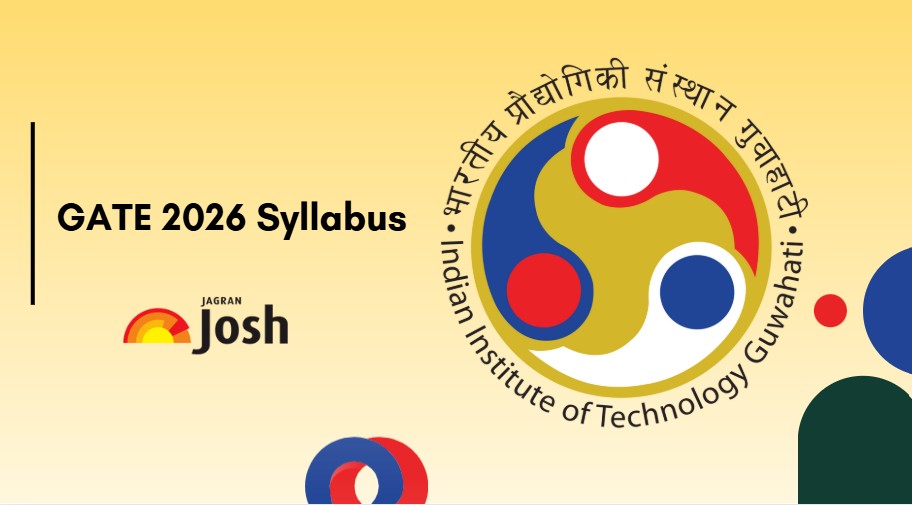GATE Syllabus 2026 forms the most crucial part of one's preparation for the exam. The GATE 2026 exam organizing institute which is IIT Guwahati, shall soon publish the GATE Syllabus 2026 PDFsubject wise on its official portal @gate2026.iitg.ac.in. The GATE syllabus consists of three subjects that include the General Aptitude, Engineering Mathematics, and Specific Technical Subjects, with a total of 65 questions. Here, aspirants can check out the detailed GATE exam syllabus as well as download subject wise PDF from here.
GATE Syllabus 2026
GATE 2026 exam aspirants should understand the GATE syllabus 2026 as it is a road map to one's success in the examination. This year, IIT Guwahati is organising the GATE exam. Hence, the syllabus for the same shall also be released by it. Aspirants must begin their exam preparation to qualify the GATE exam by covering the important topics and chapters in it. GATE exam consists of 30 papers where each of the papers have a varied syllabus and topics.
Candidates can find the latest GATE syllabus for CSE, ECE, ME, CE, and DA, and other branch codes here. Know the subject wise paper pattern, weightage, etc here.
To give you a brief idea, the GATE exam syllabus consists of three sections: general aptitude (common for all), engineering mathematics for most papers, except XL and XH, and subject-specific paper (based on your paper choice). GATE GA syllabus is common for all 30 GATE papers and holds 15% weightage in the GATE question paper. Here we have presented the GATE syllabus with the list of important topics covered in it. Candidates can also download the latest GATE syllabus PDF subject wise from here.
GATE Syllabus 2026 Overview
GATE exam syllabus is available in PDF format for all branches. The syllabus covers the topics and sub topics that are asked in the exam. The following table gives a brief of the GATE exam syllabus.
| GATE Syllabus 2026 Overview |
| Particulars | Details |
| Exam Name | GATE 2026 |
| GATE Full Form | Graduate Aptitude Test In Engineering |
| Organizing Authority | IIT Guwahati |
| GATE Syllabus 2026 Release Date | August 2025 (expected) |
| GATE Syllabus 2026 Official Website | https://gate2026.iitg.ac.in/ |
| Sections in GATE Syllabus 2026 |
General Aptitude
- Engineering Mathematics
- Core Engineering Disciplines
|
| Total No. of Papers | 30 (as per GATE 2025 details) |
| GATE Exam Date 2026 | February 2026 (expected) |
| GATE 2026 Official Website | gate2026.iitg.ac.in |
GATE 2026 Syllabus Subject List with code
GATE syllabus consists of a total of 30 subjects. The subjects that are there in the GATE exam are given in the table below along with their codes.
| GATE Syllabus 2026 Subjects List |
| 1 | Aerospace Engineering | AE |
| 2 | Agricultural Engineering | AG |
| 3 | Architecture and Planning | AR |
| 4 | Biotechnology | BT |
| 5 | Civil Engineering | CE |
| 6 | Chemical Engineering | CH |
| 7 | Computer Science and Information Technology | CS |
| 8 | Chemistry | CY |
| 9 | Electronics and Communication Engineering | EC |
| 10 | Electrical Engineering | EE |
| 11 | Ecology and Evolution | EY |
| 12 | Geology and Geophysics | GG |
| 13 | Instrumentation Engineering | IN |
| 14 | Mathematics | MA |
| 15 | Mechanical Engineering | ME |
| 16 | Mining Engineering | MN |
| 17 | Metallurgical Engineering | MT |
| 18 | Petroleum Engineering | PE |
| 19 | Physics | PH |
| 20 | Production and Industrial Engineering | PI |
| 21 | Textile Engineering and Fiber Science | TF |
| 22 | Statistics | ST |
| 23 | Biomedical Engineering | BM |
| 24 | Engineering Sciences | XE |
| 25 | Life Sciences | XL |
| 26 | Humanities and Social Sciences | XH |
| 27 | Environmental Science and Engineering | ES |
| 28 | Geomatics Engineering | GE |
| 29 | Naval Architecture and Marine Engineering | NM |
| 30 | Data Science and Artificial Intelligence (NEW) | DA |
GATE 2026 Syllabus Structure
GATE syllabus mainly consists of three sections in total. These include, General Aptitude, Engineering Mathematics and Subject Specific Questions. The following table has the GATE exam syllabus structure.
| GATE 2026 Section | GATE 2026 Weightage |
| General Aptitude (GA) | 15 Marks |
| Engineering Mathematics | 15 Marks (for applicable papers) |
| Subject-Specific Questions | 85 Marks |
GATE General Aptitude Syllabus 2026
The GATE General Aptitude syllabus or GATE GA syllabus, is common for all 30 GATE papers. All the candidates taking the GATE exam need to take this paper. The GATE GA section holds 15% weightage in the GATE question paper. Given below is the GATE GA syllabus:
| Section | Topics Covered |
| Verbal Aptitude | - Basic English Grammar: tenses, articles, adjectives, prepositions, conjunctions, verb-noun agreement, and other parts of speech - Basic Vocabulary: words, idioms, and phrases in context - Reading and Comprehension - Narrative Sequencing |
| Quantitative Aptitude | - Data Interpretation: bar graphs, pie charts, other data graphs, 2D/3D plots, maps, tables - Numerical Computation & Estimation: ratios, percentages, powers, exponents, logarithms - Permutations & Combinations, Series - Mensuration & Geometry - Elementary Statistics & Probability |
| Analytical Aptitude | - Logic: Deduction and Induction - Analogy - Numerical Relations and Reasoning |
| Spatial Aptitude | - Shape Transformation: translation, rotation, scaling, mirroring, assembling, grouping - Paper Folding & Cutting - 2D and 3D Pattern Recognition |
GATE Engineering Mathematics Syllabus 2025
Engineering Mathematics is a core subject in the GATE exam.. It tests the fundamental mathematical skills that are needed to solve engineering problems. The syllabus is designed to assess both theoretical understanding and practical application in areas such as linear algebra, calculus, differential equations, and numerical methods. Check the detailed GATE Engineering Mathematics syllabus in the table below.
| Section | Topics Covered |
| 1. Linear Algebra | - Algebra of real matrices - Determinant, inverse, and rank of a matrix - System of linear equations (unique, no, and infinite solutions) - Eigenvalues and eigenvectors - Properties of symmetric matrices - Diagonalization - Cayley-Hamilton Theorem |
| 2. Calculus | Functions of Single Variable: - Limit, continuity, differentiability - Indeterminate forms, L’Hospital’s Rule - Mean value theorems - Maxima and minima - Taylor’s Theorem - Definite and improper integrals - Area/volume applications using integration
Functions of Two Variables: - Limit, continuity, partial derivatives - Directional and total derivatives - Maxima, minima, saddle points - Lagrange multipliers - Double integrals and applications
Sequences and Series: - Convergence of sequences/series - Ratio, root, and integral tests - Power series - Taylor series - Fourier series |
| |
| 3. Vector Calculus | - Gradient, divergence, curl - Line integrals - Green’s Theorem |
| 4. Complex Variables | - Complex numbers, Argand plane, polar form - De Moivre’s Theorem - Analytic functions - Cauchy-Riemann equations |
| 5. Ordinary Differential Equations (ODEs) | - First-order (linear and nonlinear) ODEs - Second-order linear ODEs with constant/variable coefficients - Cauchy-Euler equation - Wronskian - Variation of parameters - Eigenvalue problems - Power series solutions at ordinary points |
| 6. Partial Differential Equations (PDEs) | - Classification of 2nd order PDEs - Separation of variables - 1D Heat equation - 2D Laplace equation |
| 7. Probability and Statistics | - Axioms of probability - Conditional probability and Bayes’ Theorem - Mean, variance, standard deviation - Distributions: Binomial, Poisson, Normal - Correlation and linear regression |
| 8. Numerical Methods | - Solving linear systems (LU decomposition, Gauss elimination) - Interpolation (Lagrange and Newton) - Solving equations: Newton-Raphson method - Numerical integration: Trapezoidal and Simpson’s rules - Euler’s method for solving ODEs |
GATE CS Syllabus
The chapter wise GATE syllabus for Computer Science has been shared below here. The GATE CS syllabus is highly useful to know the topics that are covered in the exam.
| Chapter | Key Topics |
| Engineering Mathematics | - Discrete Mathematics: Logic, Sets, Relations, Monoids, Groups - Graph Theory: Connectivity, Matching, Colouring - Combinatorics: Counting, Recurrence, Generating Functions - Linear Algebra: Matrices, LU Decomposition, Eigenvalues - Calculus: Limits, Maxima-Minima, Integration - Probability & Statistics: Distributions, Bayes’ Theorem |
| Digital Logic | - Boolean Algebra - Combinational & Sequential Circuits - Circuit Minimization - Number Systems & Arithmetic |
| Computer Organization & Architecture | - Machine Instructions, Addressing Modes - ALU, Control Unit - Instruction Pipelining, Hazards - Memory Hierarchy, Caches - I/O Interface: Interrupts, DMA |
| Programming & Data Structures | - C Programming - Recursion - Data Structures: Arrays, Linked Lists, Trees, Graphs, Heaps |
| Algorithms | - Searching, Sorting, Hashing - Time & Space Complexity - Greedy, DP, Divide & Conquer - MST, Shortest Path, Graph Traversals |
| Theory of Computation | - Regular Expressions, Automata - CFGs, Pushdown Automata - Turing Machines, Undecidability - Pumping Lemma |
| Compiler Design | - Lexical Analysis, Parsing - Intermediate Code, Runtime Environments - Optimization: Liveness, Constant Propagation - Data Flow Analysis |
| Operating Systems | - Processes, Threads, IPC - Concurrency, Deadlock - CPU Scheduling, Memory Management - Virtual Memory, File Systems |
| Databases | - ER Model, Relational Algebra - SQL, Normalization - Indexing: B, B+ Trees - Transactions, Concurrency |
| Computer Networks | - OSI & TCP/IP Models - Switching Techniques - Data Link: MAC, Framing - Routing Protocols - IP Addressing, NAT, IPv4 - TCP, UDP, Sockets - DNS, HTTP, SMTP, FTP |
Also check other competitive exams:


